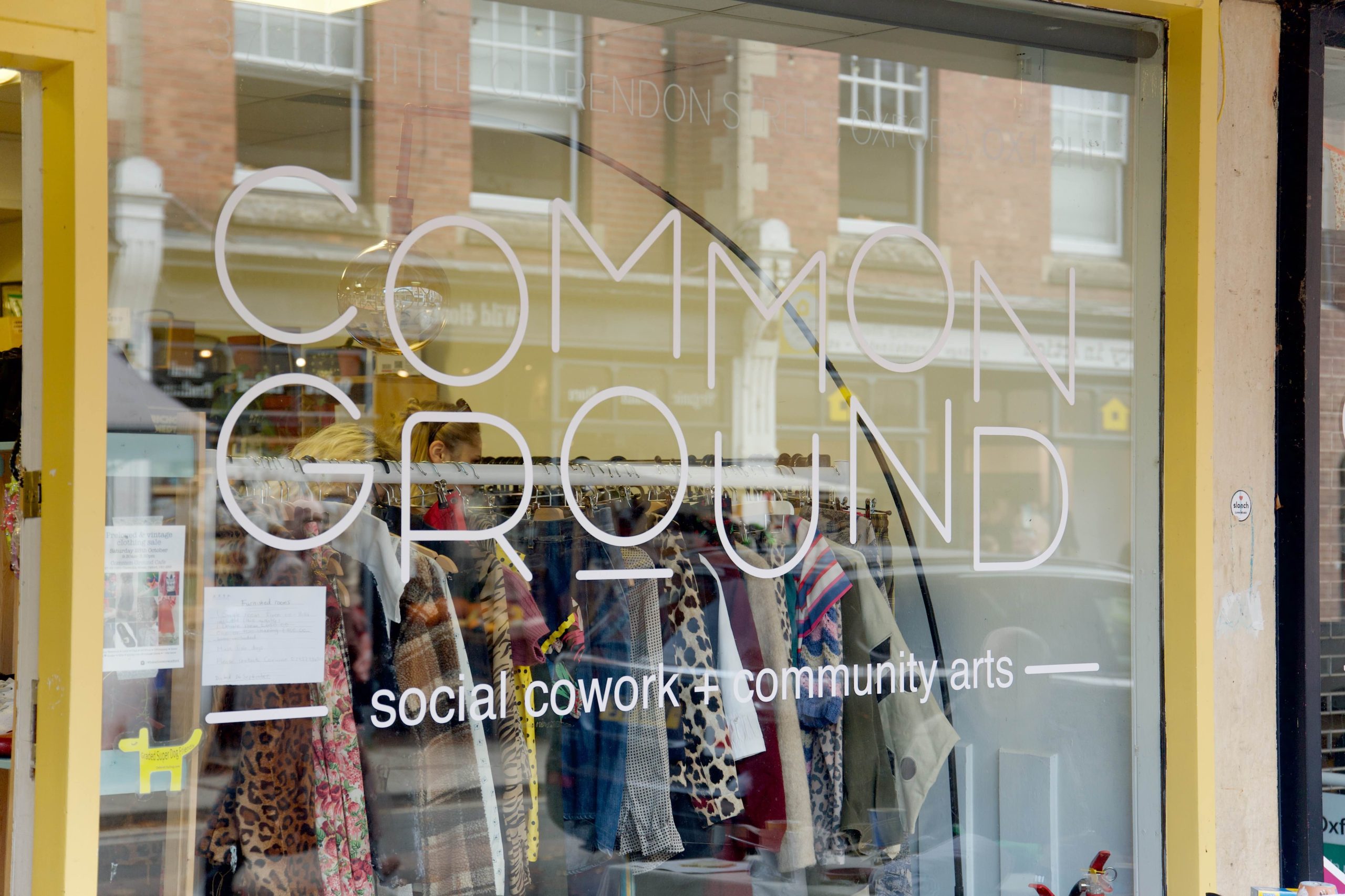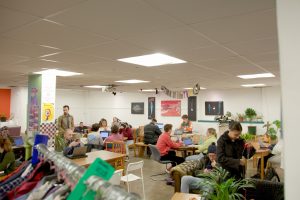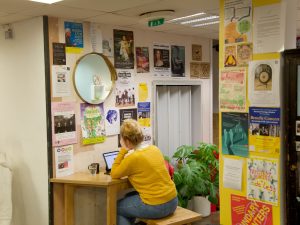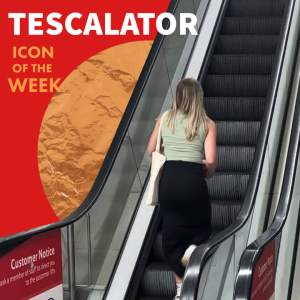
Icon of the Week: Eddie Whittingham
by Helen Edwards | October 29, 2023
Eddie Whittingham is the owner of Common Ground, a community-focussed social enterprise that, in exchange for purchasing a coffee, provides work and leisure space for Oxford’s residents.
It is a sunny Michaelmas morning as I lock my bike outside Common Ground on Little Clarendon Street. Admittedly, it is a little after the agreed 10am meeting time (this is a popular spot; bike space is hard to come by), but I am surprised at how busy the space already is. For the uninitiated, Common Ground is, as Eddie Whittingham tells me: “A co-working café, that … is open to students, open to working from home professionals, or, you know, entrepreneurs, creatives.” I spy him at the back of the venue, perched at a large table which is partially hidden by the racks of second-hand clothes they sell here. As he hops up and offers me a coffee (“yes, please, an americano”), someone wearing a neon yellow jumper comes over and greets him. Though officially the owner, the ease with which he slips behind the barista’s counter and the smile which accompanies his warm greeting of this regular customer give the sense that Eddie is not a silent spectator but rather an integral element of the community he has created.
As we head outside (to re-iterate: the space is busy and the morning sunny), the jumper-wearing customer comments on the pile, or rather, small mountain, of books that has accumulated next to the doorway. Eddie explains that in about a month’s time the venue will be adding a bookshop downstairs, as part of “a shift … towards being a co-operative business”, whereby Common Ground lends out its “spaces to independent organisations or entrepreneurs”. The co-operative business model is an extension of Common Ground’s ethos, because it means they can help the community’s other businesses as well as its consumers. As Eddie puts it: “It’s different businesses, but we’re kind of improving each other’s footfall by being in the same space, but also kind of, you know, reducing both our costs.” When asked where these books have come from, he shrugs, and says with a laugh: “Magic book fairies.” (I, for one, believe him. On the street where I grew up, there was a fairy-tree. If you left objects – cakes, glitter, books – and came back the next day, you’d be met by a reciprocal gift and a note of gratitude. Fairies like community.)
This framework extends into the evening as well, when Common Ground becomes “a multipurpose event space”. Usually, they close at five and reopen at six, with Eddie proudly adding that they’re “pretty much open every evening now,” where in the past it had only been three nights a week. Common Ground will rent out its spaces “to community organisations” which “have some kind of purpose to improve the city’s social sector”. As an example, he cites a music event that they hosted this Sunday to raise money for young women’s music projects with “an organisation based in Oxford that … provides a safe space for young, non-binary, trans, all kinds of women that allows them to express themselves through music”. Eddie is keen to emphasise Oxford’s lack of venue space: “There’s no music venues. So, we do … a lot of gigs. Grassroots musicians and artists.” And this provision of space, to listen to music, to collaborate with others, to just exist, really brings us back to the essence of Common Ground: “What we do for the community is offer space at affordable rates.”

Indeed, it feels like a solution to a problem specific to the city of Oxford. I ask Eddie why he thinks more places like Common Ground don’t exist here. “I think more places like this should exist, and they do exist in London and Bristol,” he concedes. (He has already told me he is originally from Surrey. I can’t help but wonder what the scene is like there.) Oxford’s problem? “The domineering power that the University has over property.” Common Ground is lucky to receive “good relief” on rent “from the University,” because of their social-enterprise status. Even though his point about the university is hardly shocking, as a student here, I can’t help but feel a little uncomfortable. If most of the city centre is taken up by property owned by the university, then it’s property to which I have access. I ask him whether he feels any pressure to cater more towards people who aren’t students, because Common Ground really is just that, ground which doesn’t rely on a Bod Card for access. “Yes and no,” he replies, pausing to consider. He acknowledges that “students bring a lot of … trade,” whilst admitting that “the majority of marketing, and promotional kind of techniques, is aimed slightly against students”. That’s not to say that they don’t want students there – in fact, he tells me, there is a very healthy balance of “everyday kind of people from the neighbourhood” and “people that work in Wellington Square” alongside students who frequent the premises. He knows that students like it, knows that for students Common Ground adheres to the Goldilocks principle, where it acts as “an intermediate space between … a student bedroom and a college library”. He simply explains: “I feel like students know about us. And students kind of know what we do.”
The student in me also wants to know whether there’s a point at which Common Ground would ask someone to put away their laptop or even just move on. (Whilst it wasn’t nice to be chased out of Queen’s Lane Coffee, I do understand that these businesses need to turn a profit.) Eddie’s answer provides reassurance: “Not really … I think we have enough space for someone to buy a coffee at 9am and be able to stay for like four or five hours… I think there’s an important social value in that.” With the good Wi-Fi (password: Commonbeans1), good coffee (roasters: The Missing Bean), and good food (bakers: Hamblin Bread), Eddie actually wants “to keep people as long as possible and reduce the pressure on people having to leave straight away”. Common Ground just operates on a “pay what you can afford” policy, such that even if you only buy “the cheapest item,” you still have a right to stay there “for the whole day”.

Another key contributor making it possible to stay all day is the set-up of the space. Only 25, Eddie completed a degree in Interior Architecture three years ago, and this is clearly reflected in how well the space at Common Ground works. The seating exists in clusters, which are both welcoming and workable. Welcoming, in so far as the clusters are big enough to encourage customers to sit next to strangers, meaning no seat goes unused. And workable in so far as the tables themselves are sturdy, with space to spread your laptop, coffee, notebook, and all those other props coffee-shop-enjoyers like to carry (you know the kind – a novel, perhaps, or a vintage set of headphones). Compare, for instance, the tables in Gail’s, whose flimsy forms threaten to founder the moment you pull out your chair. Certainly, Eddie briefly worked as a freelance designer for other cafés and coffee-shops in Oxford, where he noticed “the mentality of these spaces needed to be fast moving, people coming in and out very quickly”. When he mentions how this sometimes involved adding “more stalls and more benches without backrests,” the intentionality behind spatial design comes sharply into focus (and the phenomenon of hostile architecture which has been prevalent in urban planning since the 1990s comes to mind).
At any rate, Eddie demonstrates a deep understanding of how “simple design interventions can … bring communities together and create opportunities for meaningful interactions”. He describes the impact as “multi-sensorial,” whereby both “the lighting has to be right,” as does “where you put your spatial thresholds”. His knowledge has also contributed to the versatility of the venue, because, he says: “Within half an hour of closing our doors, we can reopen and host a music gig that has 100 people.” The ability to be spatially flexible in response to what’s called for aligns with Common Ground’s flexibility in what it offers more broadly to the city. His business approach finds its spatial analogue in the way Eddie treated the first six months on the job. He was just “listening to what people in the city need” with regard to Common Ground’s function, and, with regard to its space, he “didn’t do a huge amount straight away,” but just “lived in it for a couple of months, and just … tried to figure out what the dead spots were”.

When I bring up the future, he gestures to the large front-window that looks onto the bar and tells me that they’ve “just commissioned this” – his gesture gets bigger and he turns to face the shopfront, his helix piercing (another accessory typical of the coffee-shop-enjoyer) catching the sunlight – “massive shelving unit to be built”. It seems to sum up perfectly the way in which Eddie sees space as the key to Common Ground; it promises to be an area that will embody his mission. In it he envisages displaying objects that they’ll be selling, like ceramics (from the pottery workshop they’re hoping to open in the next few months), records (from the musicians they host), books (from the upcoming bookshop), and whatever else they feel the community needs. Its beauty, much like that of Common Ground itself, is that it will allow for constant change and development in what it presents. For now, Eddie reminds me, you can come to the bar every Monday, life drawing every Tuesday, and comedy every Saturday. I text the schedule to my friends while he disappears back inside.
As I’m cycling away to a class, I realise that in my rush I left my mug on the table outside. I worry that Eddie will think I have terrible manners, but I console myself by thinking of the strong sense of community I’ve just seen illustrated at Common Ground – I’m sure one of the fairies will bring it in for me.∎
Words by Helen Edwards. Photography by Daniel Stick.




